The Anime “GATE” also known as “Gate: Jieitai Kanochi nite, Kaku Tatakaeri” aired in 2015. It is of Genres: Action, Adventure, Fantasy, Isekai, and Military. It has 2 seasons with 12 episodes each. So, Get ready to buckle up, and join us on this anime’s incredible journey!
Storyline
JSDF Officer’s Heroic Actions Amid Supernatural Invasion in Tokyo
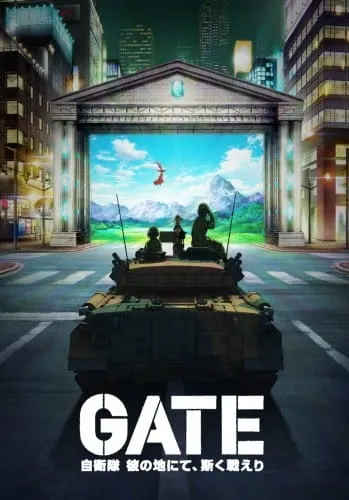
Off-duty Japan Self-Defense Forces (JSDF) officer and avid otaku, Youji Itami, is en route to a doujin convention in Ginza, Tokyo when an extraordinary event unfolds. A mysterious portal, resembling a massive gate, materializes out of nowhere. From this gate, supernatural creatures and medieval warriors surge into the city, wreaking havoc and causing destruction. Demonstrating quick thinking and bravery, Youji manages to save numerous lives while the rest of the JSDF mobilizes to halt the invasion.
Three Months Later: A New Mission Beyond the Gate
Following the chaotic attack, three months have passed. Youji Itami has been appointed to lead a special reconnaissance team, a critical part of a JSDF task force. Their mission is to venture through the enigmatic gate into a realm now dubbed the “Special Region.” The team’s objective is to explore this uncharted world, gather intelligence, and establish friendly relations with the local inhabitants, aiming to forge peaceful ties with the ruling empire. Failure in this mission could result in a catastrophic war that would devastate both worlds.
Understanding the Threat: Supernatural and Medieval Forces
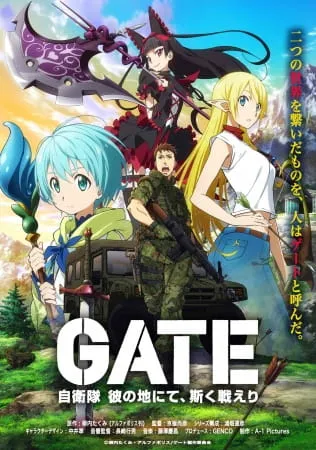
The sudden appearance of supernatural beings and armored warriors in Tokyo posed an unprecedented threat. The JSDF, renowned for its discipline and efficiency, quickly sprang into action. Youji Itami’s courageous efforts were pivotal in mitigating the initial onslaught. The JSDF’s strategic response not only contained the immediate threat but also set the stage for a more comprehensive approach to understanding and countering the invaders.
The Special Recon Team: Venturing into the Unknown
The selection of Youji Itami to lead the special recon team was a strategic decision, considering his firsthand experience and quick thinking during the initial invasion. The team’s mission in the Special Region is fraught with uncertainty. Their goals include understanding the cultural and political landscape, assessing the military capabilities of the local forces, and seeking diplomatic avenues to prevent further conflict.
Diplomacy or War: The High Stakes of the Mission
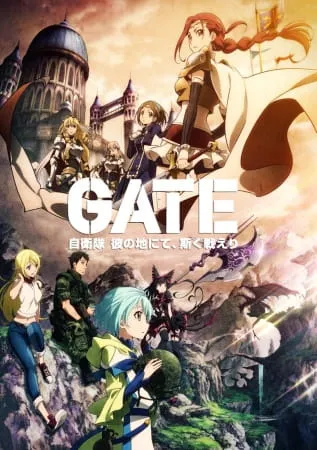
The mission’s success hinges on the team’s ability to navigate a delicate diplomatic path. Establishing trust and communication with the local empire is crucial. The consequences of failure are dire: a full-scale war that could engulf both the Special Region and Tokyo. The JSDF’s preparation involves extensive training and strategic planning, with contingencies for various scenarios they might encounter beyond the gate.
Youji Itami: A Reluctant Hero with Otaku Roots
Youji Itami’s background as an otaku adds an intriguing dimension to his role. His deep interest in fantasy worlds and doujin culture unexpectedly aligns with the realities of the Special Region. This unique perspective could prove beneficial in understanding the motivations and behaviors of the supernatural and medieval inhabitants they encounter. His leadership and ability to adapt will be crucial in navigating the complex dynamics of this new world.
The Path Forward: JSDF’s Strategic Imperative
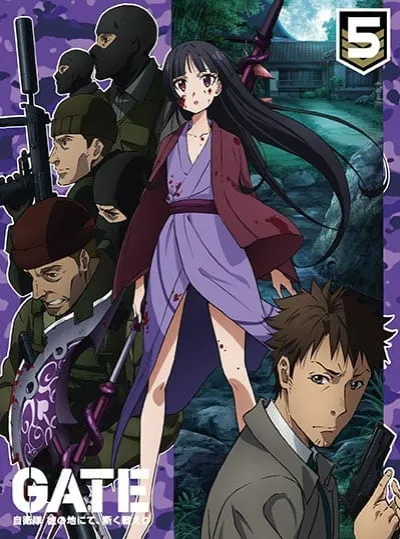
The JSDF’s approach to the Special Region is methodical and multi-faceted. Beyond the immediate goal of preventing further invasions, there is a broader strategic imperative to understand and potentially integrate this new world into their sphere of influence. This involves not only military readiness but also cultural sensitivity and diplomatic finesse. The JSDF’s ultimate aim is to secure peace and stability for both realms.
Conclusion: The Unfolding Saga of the Special Region
The story of Youji Itami and the JSDF’s venture into the Special Region is a compelling blend of military strategy, diplomacy, and personal bravery. As the team steps through the gate, they carry the hopes and fears of both Tokyo and the unknown world beyond. The unfolding saga promises to test their limits, challenge their perceptions, and ultimately determine the fate of two interconnected worlds.
Review
“GATE: Thus the JSDF Fought There!” is an anime that merges the contemporary with the fantastical, creating a unique narrative landscape. The story begins when a mysterious gate opens in Japan, connecting the modern world with a medieval fantasy realm. This unforeseen event triggers a series of encounters between Japan’s Self-Defense Forces (JSDF) and the inhabitants of the fantasy world.

Plot and Setting
The Premise of “GATE”
The anime kicks off with a dramatic incursion from the fantasy realm into modern-day Tokyo. Orcs, dragons, and medieval soldiers emerge from the gate, wreaking havoc and causing widespread panic. The protagonist, Youji Itami, an otaku and JSDF officer, finds himself at the forefront of the response effort. Japan, driven by both self-defense and a desire for technological and mineral resources, sends its military through the gate to explore and secure the new world, now dubbed the Special Region.
Plot Development
As the JSDF establishes a foothold in the Special Region, the narrative delves into various adventures and conflicts. The story alternates between intense military engagements and lighter, character-driven moments. The JSDF’s technological superiority is a recurring theme, often depicted through one-sided battles where modern weaponry outmatches medieval tactics. Alongside these battles, the series explores diplomatic efforts to forge alliances with local inhabitants, including elves, mages, and even a demigod.
Character Analysis
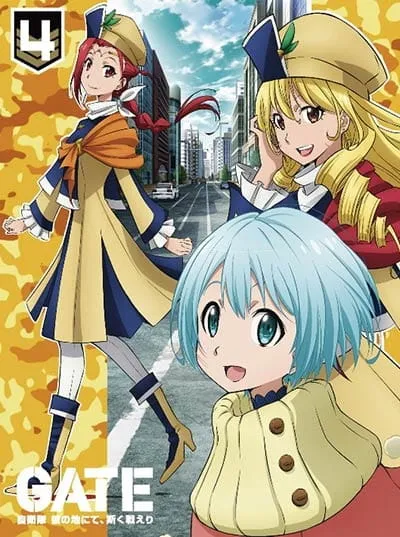
Main Characters
Youji Itami
Youji Itami is the central figure of “GATE.” Despite being a trained soldier, Itami is portrayed as a laid-back otaku with a passion for fantasy and anime. This duality in his character adds depth, making him relatable to a diverse audience. Throughout the series, Itami’s leadership and combat skills are pivotal in navigating the complexities of the Special Region.
Supporting Characters
Rory Mercury, Lelei La Rellena, and Tuka Luna Marceau are significant figures who join Itami’s journey. Rory, a 900-year-old demigoddess, brings both combat prowess and comedic elements to the story. Lelei, a young mage, represents the intellectual bridge between the two worlds. Tuka, an elf with a tragic past, adds emotional depth and highlights the human (or rather, elven) cost of the conflicts.
Character Dynamics
The interactions among the characters are a highlight of the series. Itami’s easy-going nature contrasts with the more intense personalities of his companions, creating a dynamic and engaging group. The relationships evolve as they face various challenges, and their camaraderie is a testament to the series’ strength in character development.
Themes and Motifs
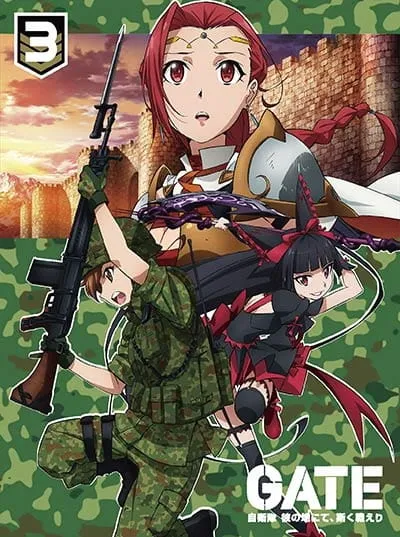
Military vs. Fantasy
A core theme of “GATE” is the clash between modern military technology and medieval fantasy. The JSDF’s overwhelming firepower often leads to lopsided battles, emphasizing the technological gap. This theme is not just for spectacle but also serves to explore deeper issues such as the ethics of warfare and the impact of advanced technology on less developed societies.
Political and Social Commentary
“GATE” delves into political themes, particularly nationalism and international relations. Japan’s unilateral control over the Special Region and its resources raises questions about imperialism and sovereignty. The series also touches on cultural misunderstandings and the challenges of diplomacy, highlighting the complexities of merging two vastly different worlds.
Visuals and Sound

Animation Quality
The animation in “GATE” is generally well-executed, with detailed renderings of both the modern military equipment and the fantastical elements of the Special Region. The action scenes are dynamic, showcasing the JSDF’s arsenal in vivid detail. However, some reviewers noted inconsistencies in character designs, particularly between male and female characters, which can be jarring at times.
Soundtrack
The soundtrack complements the series well, with a mix of intense battle music and lighter, more whimsical tunes. The opening and ending themes are catchy, though not particularly groundbreaking. Voice acting is strong across the board, with standout performances that bring the diverse cast of characters to life.
Critique and Reception
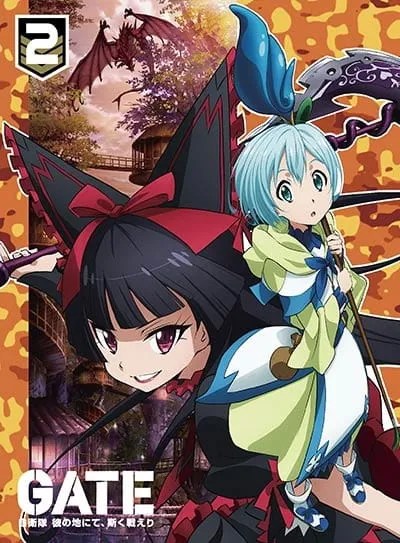
Positive Aspects
Reviewers often praise “GATE” for its unique premise and the creative blending of modern and fantasy elements. The character diversity and the interactions between the JSDF and the fantasy inhabitants are also highlighted as strengths. The series’ ability to balance intense action with humorous and heartfelt moments contributes to its appeal.
Negative Aspects
Despite its strengths, “GATE” is not without flaws. Critics point out plot inconsistencies and missed opportunities for deeper exploration of its themes. The overemphasis on fanservice and harem elements detracts from the more serious aspects of the story. Additionally, some viewers find the portrayal of the JSDF’s superiority and the nationalistic undertones problematic.
Conclusion: Overall Impression
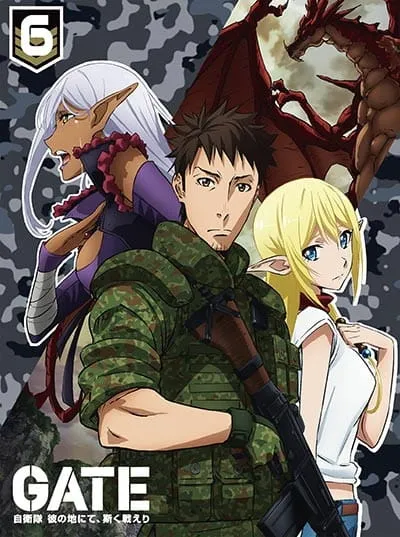
“GATE: Thus the JSDF Fought There!” is a series that boldly combines modern military might with fantasy elements, creating a unique narrative experience. While it excels in character interactions and dynamic action scenes, it sometimes falls short in plot coherence and thematic depth. Nevertheless, it offers an intriguing exploration of cultural and technological clashes, making it worth a watch for fans of both military and fantasy genres. Even if you are new to this you can give this anime a chance.
FAQs:
Is “GATE” based on a light novel?
Yes, “GATE: Thus the JSDF Fought There!” is adapted from a light novel series by Takumi Yanai.
How many episodes does the anime have?
The first season of “GATE” consists of 12 episodes, with a second season continuing the story.
What makes “GATE” unique among other anime?
“GATE” stands out for its blend of modern military elements with a medieval fantasy setting, creating a distinctive and engaging narrative.
Is there a lot of fanservice in “GATE”?
Yes, the series includes fanservice, particularly through its harem elements and character interactions.
Does “GATE” explore political themes?
Yes, “GATE” delves into political and social themes, including nationalism, diplomacy, and cultural clashes.

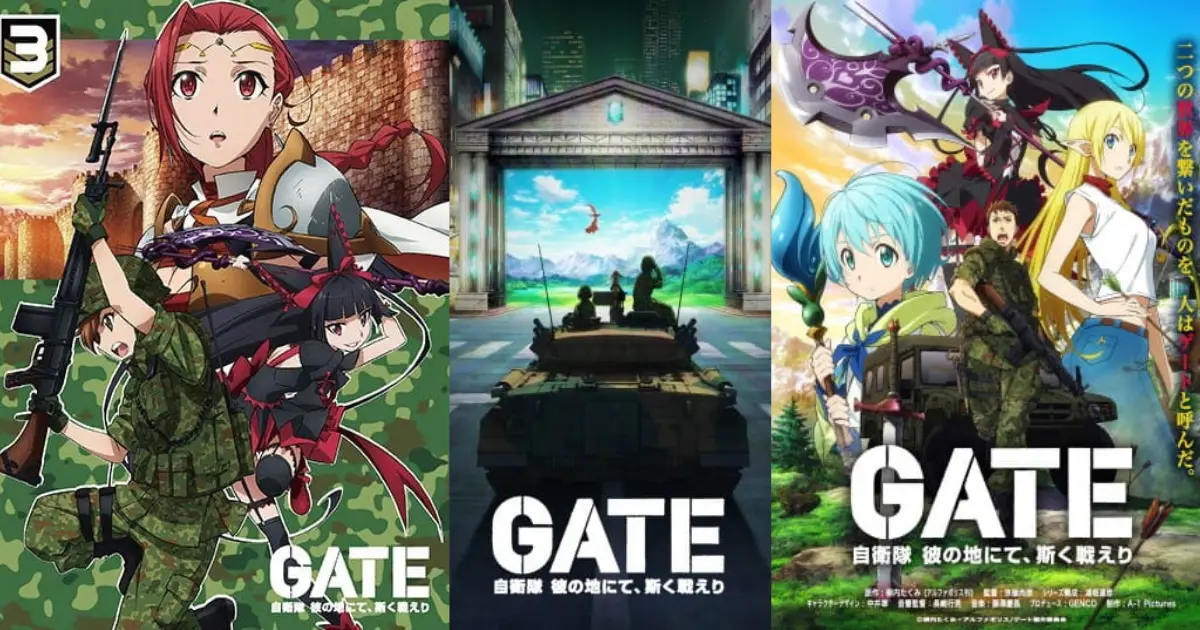
1 thought on “In-depth Analysis of Gate: Jieitai Kanochi nite, Kaku Tatakaeri”
certainly like your web site but you need to take a look at the spelling on several of your posts. Several of them are rife with spelling issues and I find it very troublesome to tell the reality then again I’ll certainly come again again.